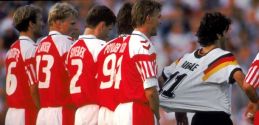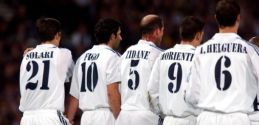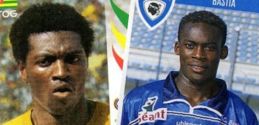
Villa’s Tokyo downfall: The apparent formality of a world title match
by Dan Mobbs
Romance isn’t a notion often associated with the Intercontinental Cup, or FIFA Club World Cup as it’s now known. Match of the Day doesn’t put together rose-tinted montages of a competition predominantly played in Japan once a year that obliges teams to participate or face legal consequences, and many would struggle to recount too much from the competition’s 58 year history.
Perhaps this is because English teams have lost seven out of eight finals and its importance has been undervalued because of a lack of success, or perhaps because it falls in the middle of hectic December fixture schedule. So, when Aston Villa lined up to face Peñarol in the 1982 Toyota World Club Championship, manager Tony Barton greeted its arrival with a sense of bullish bravado and optimism as he looked to continue his incredible start to life at Villa Park, which had seen him lift the European Cup three months after joining.
Villa’s stock had rarely been higher in a century that had largely been bookended by league and FA Cup titles and a solitary FA Cup in 1957. After Ron Saunders led his side to the league title in 1981, it was Barton who took his team to an unexpected European Cup success over Bayern Munich, but Villa’s league form had stuttered though as they followed their title winning season with an 11th place finish.
Success at Villa Park sat in stark contrast to the increasingly gloomy front pages of the era that were filled with union strikes and picket lines, car bombings, expelled cold war spies, Rene and Renata, and the uneasy threat of a new world war. So, Villa’s trip to face the South American champions in a one-off spectacle glistened with star quality in comparison.
But, in an age before mass communication, social media, and YouTube, the mystery, intrigue and excitement of playing against a team that Barton confessed to knowing “very little about” steadily grew in the columns of the Birmingham Evening Mail. Peñarol were so much of a mystery to Barton that he wouldn’t see a video of their opposition play until they touched down in Japan, so instead he looked closer to home for advice.
“We know very little about them, but we have made arrangements to watch video recording of some of their games once we arrive in Tokyo,” Barton revealed. “That should help because when Liverpool played in the final last year, Bob Paisley said their downfall was because they had never seen Flamengo in action.”
Barton added: “Peñarol have about five or six internationals, and the way they play will be an entirely new experience for us. But I doubt whether they have played many European teams, so our style could cause them a few problems…. it should be a very interesting match.”
The match was also of considerable interest to chairman, Doug Ellis, as the club was massively in debt to the tune of £1.6 million. Former full-back Harry Parkes had aimed to take control of the club with a £403,000 bid, but Ellis bought a 42% share to regain control. With that in mind, the £90,000 guaranteed prize fund on offer from sponsors Toyota was as in as much demand as the world championship crown.
First though, Villa had to overcome Arsenal to close the gap to league leaders Liverpool and keep their title chances alive. Thanks to English club’s success in the European Cup and an almost innate self-assurance on the world stage, Birmingham Evening Mail’s Ian Johnson was certain of success, even surpassing the achievements of Bob Paisley’s side who lost 3-0 to Flamengo the year before.
“Aston Villa are about to prove that they are the best in the world”, he said in the weeks before the game. “They are about to achieve what no other British side has ever done before…not even Liverpool.”
A Gordon Cowans penalty helped Villa to a 1-0 home win against West Ham on the Monday prior to the Peñarol game, but a 2-1 defeat at the hands of Arsenal two days later which was labelled as “embarrassing” by Barton hampered his team’s preparation in what had become an overcrowded fixture schedule.
Villa flew out the day after the Arsenal match with the headline ‘Villa blow it!’ still fresh in the players’ minds and a bollocking from Tony Barton still fresh in their ears.
“I shall be looking for 100 per cent improvement in Tokyo,” he said. “I reminded them that as European champions more than just English eyes will be watching their performance on Sunday.”
As it had throughout the opening half of the 1982/83 season, Villa’s away form had once again been exposed, this time on a rain-soaked Highbury pitch. Barton refused to blame the adverse conditions though, something which would be a hot topic of conversation once the squad landed in Tokyo.
Villa’s preparations were further hampered at boardroom level when Villa collected an unwanted £25,000 bill from the Football League for failing to attract an average 25,000 gate for the rearranged fixture at Highbury. “That’s charming! It’s been a bad night all round for us,” said Barton upon hearing of the fine.
That was put behind them though as a 17-hour flight to Tokyo’s new Narita Airport, via a one hour refuelling stop in Anchorage in Alaska, and Villa were in Japan. Barton’s squad of 15 (want away Andy Blair had been omitted) still hadn’t seen their opposition play prior to landing, but upon arrival managed to see a video of Peñarol’s South American Cup Final triumph.
“We have been promised tapes of the game and this will be our first opportunity of assessing the opposition,” said Barton.
This lack of access to a never ending stream of YouTube clips of far flung players renders problems like this redundant today, but one cause of consternation remains among players and managers alike, and that’s the ball.
“It’s like a beach ball you kick around on your summer holidays,” Barton said angrily. Goalkeeper, Jimmy Rimmer wasn’t too enamoured either: “I’m not very happy with it. It went out of shape after just 30 minutes. But there’s no point in complaining now. It would have been nice to have practised with it before such an important game.”
But, Graham Smith, a former West Brom goalkeeper who was working for the ball manufacturers, Le Coq Sportif said: “I don’t know what all the fuss is about. The ball is similar to the Tango type which is now being used by 14 clubs in the First Division”.
If Villa were looking for a distraction from the enormity and pressure of the game then the pitch would provide another concern as Barton labelled it as “brown, bumpy and uneven – just what we expected. We were warned by Nottingham Forest and Liverpool that it was a poor surface so we are not surprised”.
European Cup final match winner, Peter Withe, was in no mood for excuses ahead of kick-off though and at a press conference he declared, “after we have won the world title we will move on to better things”.
And despite these rumblings of discontent about the ball and pitch, the mood ahead of the game at the National Stadium in Tokyo seemed to be one of professional optimism.
“It could be a repeat of the European Cup final all over again. They play in a similar way to Bayern Munich” said Barton. “The dangers are centre-forward Morena and the Brazilian Jair in midfield, but from what I saw I did not see anything to fear”.
Barton’s lack of concern would prove to be misplaced, but it was Villa that started in a more attacking mood when Gary Shaw won a free-kick on the corner of the box. Dennis Mortimer laid it off for Gordon Cowans to strike a rasping free-kick that fizzed past Uruguay international keeper, Gustavo Fernández, but not the crossbar.
That was as close as Tony Barton’s side would come though. Peñarol grew in confidence and their authority on the game was nearly rewarded by Morena’s crisp left-foot effort. The Uruguayan A League all-time top scorer beat Allan Evans in an aerial duel on the edge of the Villa box and turned inside Gary Williams before striking the ball on the bounce, but Rimmer was equal to it and smartly saved down to his left.
The South American champions displayed class and control after an even start and it was the previously dismissed Jair who opened the scoring after 27 minutes with a 30-yard free-kick that dipped and swerved towards the keeper’s right-hand post. Rimmer scrambled across to reach it, but the combination of a deft palm and a wicked bounce meant that it rebounded off the bar into the net, despite the best efforts of Ken McNaught on the line.
Villa returned after the break in a more assertive mood, but still struggled to test Fernández, and a 30 yard Tony Morley curling free-kick that landed neatly in the keeper’s hands was as close as they came. In fact, Villa’s lack of cutting edge was an unfair reflection of their possession in the second half and had Gary Shaw done better with a header from six yards then the game would have taken on a different complexion. However, as Villa pushed for an equaliser in the second-half Peñarol took a firm hold of the game thanks to a defensive lapse in concentration.
This time it was the winger, Walkir Silva, who pounced decisively in the 68th minute when Cowans lost possession in midfield and neat through ball released Silva. As he advanced towards Rimmer, Evans raced back to intercept and his lunging challenge forced the keeper into action and save low to his right, but he couldn’t prevent the forward tapping into an empty net via the near post.
Villa’s belief that they were going to find a reply seemed to ebb away as the second half continued and the result could have had an even glossier finish as Silva found himself one-on-one with Rimmer, but he spurned the opportunity when he stood on the ball and Mark Jones dispossessed him.
The referee blew the whistle moments later and right back, Walter Olivera, lifted the trophy to confirm Peñarol’s third world title, following victories in 1961 and 1966 over Benfica and Real Madrid respectively.
Even better was to come for opening goalscorer Jair, who was voted Man of the Match by sponsors Toyota and given an oversize novelty key trophy, as well as the actual keys to a new Carina.
“In the first 20 minutes we thought we were going to win it by two or three goals” exclaimed Gordon Cowans, but that wasn’t Jimmy Rimmer’s main concern, as he reasoned why he conceded the first goal, which was labelled as a “banana” free-kick by the Birmingham Evening Mail.
“The free-kick from Jair bent all over the place. I got a hand on it and pushed it onto the post. But there was so much bounce on the ball and it flew onto the bar and I lost sight of it”
However, upon reflection Peter Withe was considerably more pragmatic about the game, telling reporters: “We never really looked like scoring. We could have been playing all week without scoring and that was the difference.”
Despite the defeat, Barton and the Villa team appeared to treat it as a minor blip in Villa’s trajectory towards better things. Barton even stated defiantly after the defeat that: “We will be back. It was a valuable experience. Now we have had a taste of the competition we are determined to return”.
The opportunity never materialised, as the success that defined Barton’s first few seasons in charge of Villa slowly eroded and the title chasing encounters were replaced by a mid-table obscurity and a memory of success.
Villa’s chances of winning their second league title in three seasons in 1982/83 was diminished six days after their return from Japan by a 4-2 home defeat to eventual winners Liverpool and Barton’s side would eventually finish sixth. But, by far the shining glory in the season was a 3-1 aggregate win over Barcelona in the European Super Cup, which saw Barton’s side enjoy a 3-0 win over that Catalans at Villa Park in a feisty game that saw three red cards.
A tenth placed finish followed that in the 1983-84 season and Barton was sacked in May 1984. Today, the allure and promise of a Club World Cup final and the chance to be labelled as the best in the world seems as far away now, as it seemed mysterious and exotic then.
• All quotations are taken from the Birmingham Evening Mail, Wednesday 1 December to Wednesday 15 December 1982 and were researched at the National Newspaper Archive in the British Library.
Tags: Aston Villa, Champions League, Club World Cup, Gordon Cowans, Penarol, Peter Withe, Premier LeagueShare this article
Leave a comment
- When did co-commentary become such a serious and miserable business?
- Why do we devote so much time to sharing our love of football for free?
- Villa’s Tokyo downfall: The apparent formality of a world title match
- Son Heung-min and the forgotten wonder goals
- Guess the Premier League goalscorer from the GIF
- A fateful flight
- Goodbye to the instant analogue gratification of Ceefax
- Player Profile: Steve Ogrizovic
- Rejecting FA Cup money in favour of a car boot sale
- It’s a man’s world? Former Arsenal manager crosses the gender divide











